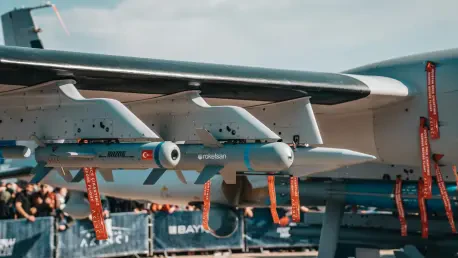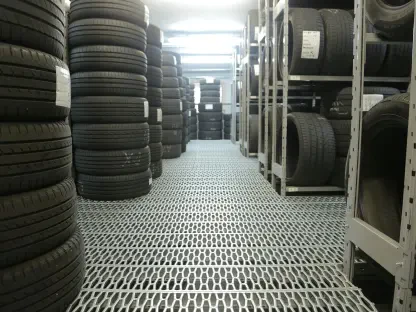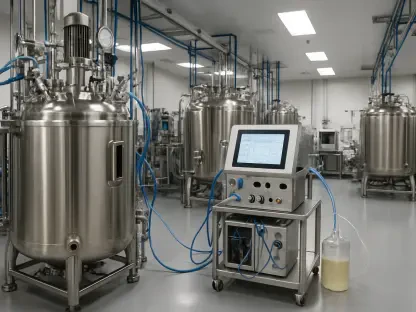In a world where military prowess often dictates geopolitical influence, Turkey has carved out a remarkable position as an emerging titan in the defense sector, transitioning from a nation heavily dependent on foreign arms to a confident exporter of cutting-edge military technology. This transformation is not merely a matter of industrial growth but a reflection of a broader national strategy rooted in self-reliance and innovation. Over recent decades, Turkey has invested significantly in indigenous research and development, reducing its reliance on external suppliers and positioning itself as a credible player on the global stage. Companies such as Baykar, ASELSAN, Roketsan, and Turkish Aerospace Industries (TAI) have become synonymous with technological advancement, with products like the Bayraktar TB2 drone gaining international acclaim for their battlefield effectiveness. Yet, this ascent is accompanied by complex challenges, including geopolitical tensions with key allies and economic pressures at home. The duality of Turkey’s image—admired for its ingenuity yet scrutinized for its assertive foreign policy—paints a nuanced picture of a nation striving to balance ambition with diplomacy. This article explores the driving forces behind Turkey’s rise in the defense industry, the geopolitical implications of its growing influence, and the significant hurdles it must navigate to sustain its trajectory.
Drivers of Success
Technological Innovation and Indigenous Growth
Turkey’s ascent in the global defense arena is fundamentally tied to its unwavering commitment to technological innovation and indigenous development, a strategy that has redefined its military capabilities over the past few decades. Through substantial investments in research and development, the country has cultivated a robust ecosystem of over 2,000 defense companies collaborating with academic institutions and government bodies. Firms like ASELSAN have emerged as leaders in electronic warfare and radar systems, while Roketsan has made significant strides in missile technology. The cornerstone of this innovation is the Bayraktar TB2 drone, developed by Baykar, which has demonstrated remarkable precision in conflicts across multiple regions. This drone’s success is not just a technological feat but a symbol of Turkey’s ability to produce high-impact, cost-effective solutions that rival more expensive Western alternatives. The focus on homegrown technology, supported by initiatives like the National Technology Move, underscores a long-term vision for self-sufficiency that has reshaped international perceptions of Turkey’s industrial capacity.
Beyond individual products, Turkey’s ambition extends to complex systems like the TF-X National Combat Aircraft, a project aimed at placing the country among the elite few capable of producing fifth-generation fighter jets. Although delays and funding challenges persist, the initiative reflects a forward-thinking approach to future warfare technologies, including artificial intelligence and cybersecurity. The government’s role in fostering innovation cannot be overstated, with the Presidency of Defense Industries (SSB) acting as a catalyst for partnerships and resource allocation. However, limitations in accessing cutting-edge components due to international restrictions highlight the need for deeper investment in domestic supply chains. This drive for technological autonomy, while impressive, requires sustained effort to overcome external barriers and maintain momentum in a highly competitive global market.
Export Achievements and Market Expansion
Turkey’s defense industry has witnessed exponential growth in exports, establishing it as a key supplier in the international arms trade and a vital contributor to the national economy. With exports surpassing $4 billion in recent years, the country has successfully penetrated markets in the Middle East, Africa, Central Asia, and Eastern Europe, often outpacing traditional suppliers through competitive pricing and flexible financing. The Bayraktar TB2 drone stands as a flagship success, adopted by over 20 countries and proving instrumental in conflicts such as Ukraine’s defense efforts. Its affordability, coupled with combat-proven reliability, has made it a preferred choice for nations seeking effective military solutions without the hefty price tag of Western systems. This export surge reflects Turkey’s strategic ability to fill gaps left by suppliers with stringent export controls, positioning it as an alternative for countries navigating political or financial constraints.
Additionally, Turkey’s export portfolio extends beyond drones to include naval vessels, armored vehicles, and small arms, showcasing a versatile manufacturing base. The MILGEM corvette project, for instance, has secured contracts with nations like Pakistan, while companies such as BMC and Otokar supply rugged vehicles suited for counter-insurgency operations in challenging terrains. This diversification strengthens Turkey’s economic resilience by reducing dependence on any single market or product. Targeting emerging markets in the Global South has also aligned with broader foreign policy goals, enhancing Turkey’s influence in regions often overlooked by major powers. Nevertheless, reliance on politically unstable markets introduces risks, as regional conflicts or international sanctions could disrupt revenue streams, necessitating a cautious approach to sustain this export-driven growth.
Geopolitical Implications
Regional Influence and Foreign Policy Tool
Turkey’s defense industry serves as a powerful instrument of foreign policy, significantly amplifying its regional influence and shaping strategic outcomes in volatile areas. By supplying military hardware to conflict zones, Turkey has extended its footprint in regions like the Middle East, North Africa, and the Caucasus, often positioning itself as a counterweight to other powers. The pivotal role of Turkish drones in the 2020 Nagorno-Karabakh conflict, where they tipped the balance in favor of Azerbaijan, exemplifies how defense technology can alter regional dynamics. Such interventions have bolstered Turkey’s image as a reliable partner to allied nations while simultaneously projecting strength and determination on the international stage. This strategic use of military exports not only secures economic gains but also cements Turkey’s status as a key player in shaping geopolitical landscapes.
However, this approach has sparked controversy among international observers who argue that Turkey’s actions sometimes exacerbate instability rather than resolve it. In Libya, for instance, Turkish military support has been credited with altering the course of the civil war, yet it has also drawn criticism for prolonging conflict and challenging the interests of other stakeholders, including European nations and Russia. Similarly, Turkey’s assertive posture in the Eastern Mediterranean, backed by naval capabilities like the MILGEM vessels, has heightened tensions with neighbors such as Greece and Cyprus. While these moves underscore the defense industry’s role in advancing national interests, they also highlight the delicate balance Turkey must maintain to avoid being perceived as a destabilizing force. Navigating these perceptions will be crucial for sustaining long-term regional partnerships.
Tensions with Allies and Global Perception
Turkey’s rapid rise in the defense sector has not come without significant friction with traditional allies, particularly within the NATO framework, shaping a polarized global perception of its ambitions. The acquisition of the Russian S-400 missile defense system stands as a stark example of a decision that addressed a pressing security need but alienated key partners like the United States. This move led to Turkey’s exclusion from the F-35 program and sanctions under the Countering America’s Adversaries Through Sanctions Act (CAATSA), resulting in substantial financial losses and restricted access to advanced technology. Such fallout underscores how defense procurement choices can reverberate into broader diplomatic consequences, casting doubts on Turkey’s reliability as an alliance member and complicating its standing within Western security structures.
Moreover, Turkey’s military operations and foreign policy assertiveness have fueled additional tensions, with some European nations imposing temporary arms embargoes or restrictions on defense cooperation. Canada’s suspension of exports following evidence of technology misuse in regional conflicts further illustrates how Turkey’s actions can impact international trust. Globally, this creates a mixed narrative: while Turkey’s technological achievements and export successes are widely admired, concerns over its geopolitical decisions often overshadow these accomplishments. Balancing national security priorities with the expectations of allies remains a persistent challenge as Turkey seeks to assert autonomy without sacrificing critical partnerships. This dichotomy continues to define how the international community views Turkey’s role in the defense landscape.
Challenges Ahead
International Relations and Alliance Strains
Turkey’s defense industry, despite its impressive growth, faces substantial challenges in maintaining constructive relationships with Western partners, largely due to divergent foreign policy priorities and military engagements. The strain with NATO allies, particularly the United States, over decisions like the S-400 purchase has had tangible repercussions, including exclusion from collaborative projects and the imposition of sanctions. These measures not only limit access to cutting-edge technology but also signal a broader erosion of trust within the alliance. Human rights concerns related to Turkey’s military operations, especially in Syria, have further complicated matters, prompting criticism from international bodies and leading to export restrictions from countries like Canada. Such actions highlight the intricate interplay between defense industry advancements and diplomatic relations, where national decisions can directly impact global cooperation.
Additionally, Turkey’s assertive stance in regional disputes, such as those in the Eastern Mediterranean, has drawn ire from European Union members, some of whom advocate for stricter controls on arms trade with Turkey. These tensions pose risks to collaborative defense initiatives and access to critical markets, potentially isolating Turkey from technological and financial networks essential for sustained growth. Overcoming these alliance strains requires a delicate approach, prioritizing dialogue and compromise to rebuild confidence among partners. Without strategic recalibration, the defense sector’s achievements risk being undermined by diplomatic fallout, emphasizing the need for Turkey to align its ambitions with the broader goals of international security frameworks.
Economic Pressures and Sustainability
The sustainability of Turkey’s defense industry is under threat from internal economic challenges that could hinder long-term investment and innovation if not addressed effectively. High inflation rates and currency depreciation have strained national budgets, raising questions about the feasibility of funding ambitious projects like the TF-X National Combat Aircraft, which demands significant resources and international collaboration. Economic instability not only impacts government spending on defense R&D but also affects the broader industrial base, as smaller companies struggle with rising costs and limited access to capital. These financial constraints pose a critical risk to maintaining the momentum of technological advancement, a cornerstone of Turkey’s global reputation in the sector.
Furthermore, the economic downturn exacerbates the challenge of competing in a global market where innovation requires consistent and substantial investment. Projects like the Altay main battle tank have already faced delays due to funding shortages and supply chain disruptions, illustrating the vulnerability of high-cost initiatives to fiscal pressures. To mitigate these risks, Turkey must prioritize economic stabilization through targeted reforms and explore alternative funding mechanisms, such as public-private partnerships or diversified export revenues. Building resilience against domestic economic headwinds will be essential to ensure that the defense industry can continue to thrive and support national security objectives without being derailed by financial limitations.
Balancing Ambition with Diplomacy
Navigating the fine line between pursuing national ambitions and maintaining diplomatic harmony remains one of the most formidable challenges for Turkey’s defense industry as it seeks to solidify its global standing. The drive for strategic autonomy, while a source of pride and strength, often places Turkey at odds with allies who view certain decisions as contrary to collective security interests. The S-400 acquisition exemplifies this tension, as it addressed a critical defense gap but triggered sanctions and exclusion from key programs like the F-35, highlighting the broader costs of unilateral actions. Striking a balance between asserting independence and fostering cooperation with Western partners is crucial to avoid isolation and preserve access to vital technological and financial resources.
Equally important is the need to manage the geopolitical risks associated with Turkey’s expanding role in conflict zones and emerging markets, where defense exports can both build alliances and provoke backlash. Engaging with politically unstable regions introduces uncertainties that could disrupt long-term strategies, while military interventions draw scrutiny from international actors concerned about regional stability. A nuanced diplomatic approach, emphasizing transparency and collaboration, could help mitigate these risks and enhance Turkey’s credibility as a responsible global player. Ultimately, the path forward lies in aligning defense industry goals with broader foreign policy objectives, ensuring that ambition does not come at the expense of essential partnerships or international goodwill.
Future Pathways and Strategic Considerations
Adapting to a Shifting Global Landscape
As Turkey’s defense industry continues to evolve, adapting to the shifting dynamics of the global arms trade and geopolitical environment emerges as a critical priority for sustained success. The rise as a middle-tier defense power, while notable, places Turkey in a competitive space where it must differentiate itself from both established giants like the United States and Russia, and other emerging players such as South Korea. Leveraging the combat-proven credibility of systems like the Bayraktar TB2 offers a unique advantage, as real-world effectiveness enhances market appeal and builds trust among potential buyers. Strengthening partnerships with non-Western nations in the Global South can further diversify Turkey’s export base, reducing reliance on volatile Western markets and aligning with a strategic pivot toward underrepresented regions. However, this approach must be carefully managed to avoid overexposure to political instability in these areas.
Equally vital is the need to anticipate technological trends that will shape the future of warfare, such as autonomous systems and cyber defense capabilities, where Turkey has already begun to invest. Collaborating with international partners on emerging technologies could accelerate progress, provided geopolitical barriers are navigated effectively. Building on past achievements, Turkey should also prioritize enhancing domestic supply chains to lessen dependence on foreign components, a vulnerability exposed by sanctions and export controls. By focusing on resilience and innovation, Turkey can position itself to capitalize on future opportunities in the defense sector, ensuring that its growth trajectory remains robust amidst a rapidly changing global landscape.
Building Sustainable Growth and Trust
Looking back on Turkey’s journey, the defense industry’s rise reflects a determined push for self-reliance and innovation that reshaped its international standing over time. Reflecting on past strides, the focus must now shift toward building sustainable growth and restoring trust with key international partners to secure a stable future. Addressing economic constraints through strategic fiscal policies and diversified funding sources proved essential in the past and remains a priority to support ongoing and future projects. Historical efforts to expand export markets demonstrated success, but moving forward, a balanced approach that mitigates risks associated with unstable regions will be necessary to maintain economic gains. Turkey’s earlier achievements in combat-proven systems set a strong foundation, and continuing to emphasize quality and reliability can further solidify its reputation.
Moreover, rebuilding trust with NATO allies and other Western partners, strained by past geopolitical decisions, should be a cornerstone of future strategy. Engaging in transparent dialogue and seeking collaborative projects can help mend diplomatic rifts, ensuring access to critical technologies and markets. Lessons from previous controversies, such as the S-400 fallout, underscore the importance of aligning defense ambitions with alliance commitments to prevent isolation. By prioritizing diplomacy alongside industrial growth, Turkey can address historical challenges and pave the way for a more integrated role in the global defense community. This dual focus on sustainability and trust offers a pragmatic roadmap for navigating the complexities ahead, ensuring that past successes translate into enduring influence.









